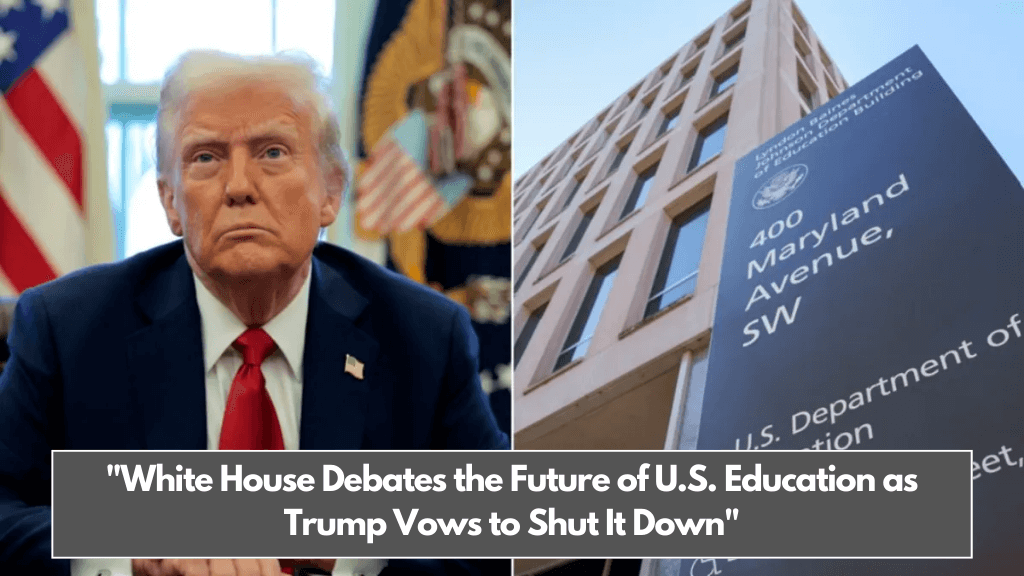President Donald Trump is reportedly taking steps toward dismantling the U.S. Department of Education, a move that aligns with his campaign promise to reduce the size of the federal government and return more control over education to states and local governments.
While Trump cannot abolish the department via executive order, he could weaken its functions and push Congress to pass legislation eliminating the agency entirely.
What Trump’s Plan Involves
According to a White House official, Trump’s strategy includes defunding the Department of Education, directing its responsibilities to other agencies, and encouraging lawmakers to pass legislation to formally close the department.
The effort follows a Republican proposal in Congress that was reintroduced last month but faces significant political hurdles due to the GOP’s slim majority.
Why Trump Wants to Close the Department
On the campaign trail, Trump repeatedly criticized the Department of Education, arguing that it represented federal overreach into areas best handled by state and local governments. He proposed returning much of its authority to the states while cutting federal oversight of public schools.
“We need to empower parents, not bureaucrats, to decide what’s best for our kids,” Trump said during a campaign event.
Current Challenges in Dismantling the Agency
While Trump does not have the authority to unilaterally close the department, experts say he could issue an executive directive instructing the acting education secretary to reallocate responsibilities and propose plans to downsize its functions.
The acting secretary, Denise Carter, could spearhead this effort until Linda McMahon, Trump’s nominee for education secretary, is confirmed. McMahon’s confirmation, however, has been delayed due to issues with her ethics paperwork.
Shuttering a federal agency would also require Congressional approval. While some Republican lawmakers support the idea, experts, including Karen McCarthy, vice president of public policy at the National Association of Student Financial Aid Administrators, caution that the GOP may lack the votes to pass such a controversial measure.
“They don’t appear to have enough support right now, but that could change,” McCarthy said.
What the Department of Education Does
The Department of Education, established in 1979, plays a significant role in administering federal student loans, enforcing anti-discrimination laws, and protecting students from predatory colleges. It oversees nearly $2 trillion in federal student loans, a figure comparable to major financial institutions.
Some Republicans have proposed moving the management of student loans to the Department of the Treasury, but experts warn that doing so would be complex.
“Nobody could really imagine that Chase could fold into Citibank quickly or easily,” McCarthy said. “I don’t know why people are thinking that the federal student loan portfolio could easily move.”
Political Shifts Under the New Administration
Even without formal legislation to close the department, the Trump administration has already begun making significant changes.
- Diversity, equity, and inclusion references have been removed from the department’s website.
- Investigations have been launched into high schools with gender-neutral bathrooms.
- The administration has frozen several Biden-era policies, including those related to student loan relief and college oversight.
The department is now a vocal advocate of school choice programs, which Trump has long supported as a way to allow parents to choose private, charter, or public schools for their children using public funds.
Potential Impacts of Closing the Department
Critics argue that dismantling the Department of Education could lead to:
- Reduced protections for students against discrimination and predatory educational institutions.
- Confusion and delays in managing the $2 trillion federal student loan portfolio.
- Increased disparities in education, as states with fewer resources may struggle to maintain standards without federal support.
Advocates of the plan, however, believe that state and local governments are better equipped to handle education policy and that federal intervention should be minimized.
What Happens Next?
The administration is expected to present its initial plans for restructuring the department in the coming weeks. Meanwhile, Congress will have to decide whether it will support Trump’s proposal to eliminate the department entirely.
The outcome will likely depend on Republican unity in both chambers and public reaction to the potential consequences of closing the agency.
Trump’s plan to dismantle the Department of Education marks a significant shift in federal education policy. While the path to eliminating the department faces major legislative challenges, the administration’s efforts to reduce its influence are already reshaping its role. As debates continue, the future of federal oversight in education remains uncertain.
